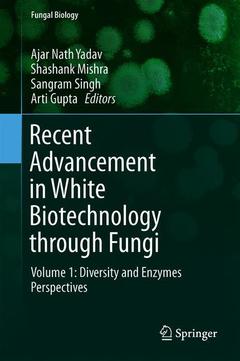Description
Recent Advancement in White Biotechnology Through Fungi, 1st ed. 2019
Volume 1: Diversity and Enzymes Perspectives
Fungal Biology Series
Coordinators: Yadav Ajar Nath, Mishra Shashank, Singh Sangram, Gupta Arti
Language: English
Subjects for Recent Advancement in White Biotechnology Through Fungi:
571 p. · 15.5x23.5 cm · Hardback
Description
/li>Contents
/li>Biography
/li>Comment
/li>
Chapter 1 Biodiversity of Fungi from Extreme Habitats and Its Industrials Applications
Laura Selbmann, University of Tuscia , Viterbo, Italy
Chapter 2 Rhizospheric Fungi Isolated from Different Plants and Potential Applications in Diverse Sectors
Welington Luiz Araújo, University of São Paulo, São Paulo, Brazil,
Chapter 3 Endophytic Fungi from Different Niches with Potential Industrial Important
Kusam Lata Rana, Eternal University, India
Chapter 4 Marine Fungal White Biotechnology: An Ecological and Industrial Perspective
Lara D. Sette, Universidade Estadual Paulista Júlio de Mesquita Filho, Rio Claro, Brazi
Chapter5 Aspergillus: Biodiversity, Ecological Significances and Industrial Applications
G. Perrone, CNR, Bari, Italy
Chapter 6 Fusarium: Biodiversity, Ecological Significances and Industrial Applications
Neera, Defence Food Research Laboratory, India
Chapter 7 Penicillium: Biodiversity, Ecological Significances and Industrial Applications
M. L. T. M. Polizeli, Ribeirão Preto, São Paulo, Brazil
Chapter 8 Trichoderma: Biodiversity, Ecological Significances and Industrial Applications
Eleonora Cano Carmona, Cidade Universitária, Recife, PE, Brazil
Chapter 9 Thermostable Enzymes from Fungi Isolated from Hot Springs and Its Applications
Paramasamy Gunasekaran, Madurai Kamaraj University, Madurai, India
Chapter 10 Cold Active Enzymes from Psychrophilic Fungi and Its Applications
Shashwati Ghosh Sachan, BIT, India
Chapter 11 Industrially Important Enzymes from White-Rot Fungi or Filamentous Fungi
Leif J Jönsson, Umeå University, Umeå, Sweden
Chapter12 Fungal Enzymes for the Textile Industry
Giovanna Cristina Varese, University of Turin, Turin, Italy
Chapter 13 Fungal Laccase: A Versatile Enzyme for Biotechnological Applications
Susana Rodríguez‐Couto, Basque Foundation for Science, Bilbao, Spain
Chapter 14 Fermentation Process for Production of Fungal Cellulases: Improvement Strategies
Benjamin Singh, University of Calicut, India
Chapter 15 Fungal Lipases: A Versatile Tools for White Biotechnology
K-E. Jaeger, Ruhr-Universität, Germany
Chapter16 Fungal Community: An Eco-Friendly Bioresources for Novel Secondary Metabolites
Amod Kumar, University of Delhi, New Delhi, India
Chapter17 Agriculturally Important Fungi: Role of Bio-Active Compounds for Abiotic Stress Tolerance in Plants
Divjot Kour, Eternal University, India
Chapter 18 Fungal White Biotechnology in BiosurfactantsKuttuvan Valappil Sajna, CSIR-National Institute for Interdisciplinary Science and Technology, Kerala, India
Chapter 19 Synthetic Biology: A Novel Approach for Pharmaceutically Important Compounds
H. Neumann, Georg-August University Göttingen, Germany
Chapter 20 Global Scenario of Fungal White Biotechnology: Past, Present and Future
Zhenjiang Li, Nanjing University of Technology, Nanjing, China
Appendixes
Index
This is the first comprehensive work on white biotechnology through fungi
It covers all the diversity from different habitats and its role in industry
This work also provides key knowledge on the different novel secondary metabolites of pharmaceutical importance
Written by leading scholars from around the world




